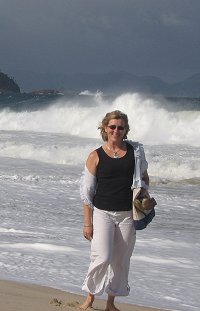
Kathleen M. GYSSELS is professor of Francophone Postcolonial Literatures at the
University of Antwerp. Her research focuses on Afro-Caribbean and African-American
Literatures, and is situated at the crossroads of Francophone Studies, Postcolonial
Theories and Comparative Literature. She deals with notions as intertextuality,
the mixing of genres, post-coloniality and post-modernity.
She also teaches seminars on Francophone Jewish literature (see website Institute
for Jewish Studies) and postcolonial literatures in comparative perspective at the
University of Leuven (KUL).
Coordinator of the Research Group for Postcolonial Literatures (Sept 1998-), she
was vice-president of the Society for Caribbean Research (Sept 2003-Sept 2009).
She is on the board of Essays of Francophone Literature and Culture (University
of Western Australia) and co-organized several conferences on Caribbean literature
in diaspora (Franklin College, Switzerland, April 2009, University of Lissabon,
November 2009).
See:
http://www.ua.ac.be/postcolonial
http://www.european.uwa.edu.au/about/research/essays
kathleen.gyssels@ua.ac.be
Öffentliche Vorträge
“Haiti and Haitian literature: enigma, stigma and the paradoxes of being
the first postcolonial nation”
Gästehaus Teerhof
In this lecture I would like to emphasize some important paradoxes concerning Haiti
and Haitian literature. How come that the poorest country in the Western Hemisphere
has the most prolific Francophone postcolonial authors and how come that in their
works, some blind spots have belatedly been interrogated, such as: the Middle Passage,
Slavery and Toussaint Louverture (whose fictional biography has only been ‘written’,
imagined, from 2004 onwards, with the Bicentennial of the Haitian Revolution).
« Créolisátion du monde? Des manifestes de la Caraïbe »
Institut Français
Créolisation - par ce mot très à la mode, les Caribéens désignent
le métissage de ‘races’, langues et cultures. Revendication du créole comme langue
littéraire, de l’hybridité comme modèle du transculturel dans nos sociétés
mixtes, la créolisation et son dérivé, la créolité marquent aussi la troisième étape
dans la manifestation identitaire proprement franco-caribéenne. Depuis le fameux
manifeste Eloge de la créolité (1989), un nombre impressionnant de manifestes
a vu le jour qui méritent qu’on réfléchisse sur leur portée, leur signification,
leur impact, que ce soit pour les Créoles ou pour les Brémiens : par ailleurs, ne
seriez-vous pas Créoles ?
Seminar:
Passes and Impasses in Postcolonial Caribbean Comparative Literature. Five Exercises
Caribbean literature has encountered a lot of dead-end situations when it comes
to comparatism(e)/comparative approaches. Indeed, its most important theoretical
spokespeople such as Edouard Glissant and Maryse Condé, next to their Anglophone
counterparts Wilson Harris and Sylvia Winter, have called the Caribbean a “unity
in diversity”. However, it seems that critical endeavors don't follow this call
to “debalkanize” the literary system and that authors from Francophone and Anglophone
contexts (just to focus on those two highly parallel literary systems, both in terms
of literary history and international celebrity status) still remain separate, divided
along "passes" (maritime frontiers and linguistic borders). In this seminar,
we will examine a representative group of authors from three generations who have
published on the same topics and have never been compared! What I would like to
see the seminar participants become is Caribbeanists of a new order, reading against
the grain and fully becoming comparatists.
Texts studied:
- Moi, Tituba sorcière… (1988), Maryse Condé
- Black-Label et autres poèmes (1956), Léon-Gontran Damas
- Beloved (1987), Toni Morrison
- Aube tranquille (1990), Jean-Claude Fignolé
- Palace of the Peacock (1960),Wilson Harris
- La Lézarde (1958), Edouard Glissant
Course language:
The seminar will be held in English and/or French, according to the students' language
skills. The language use of the seminar may also change, depending on the subject
of different course sessions respectively. This will be decided at the beginning
of the semester.